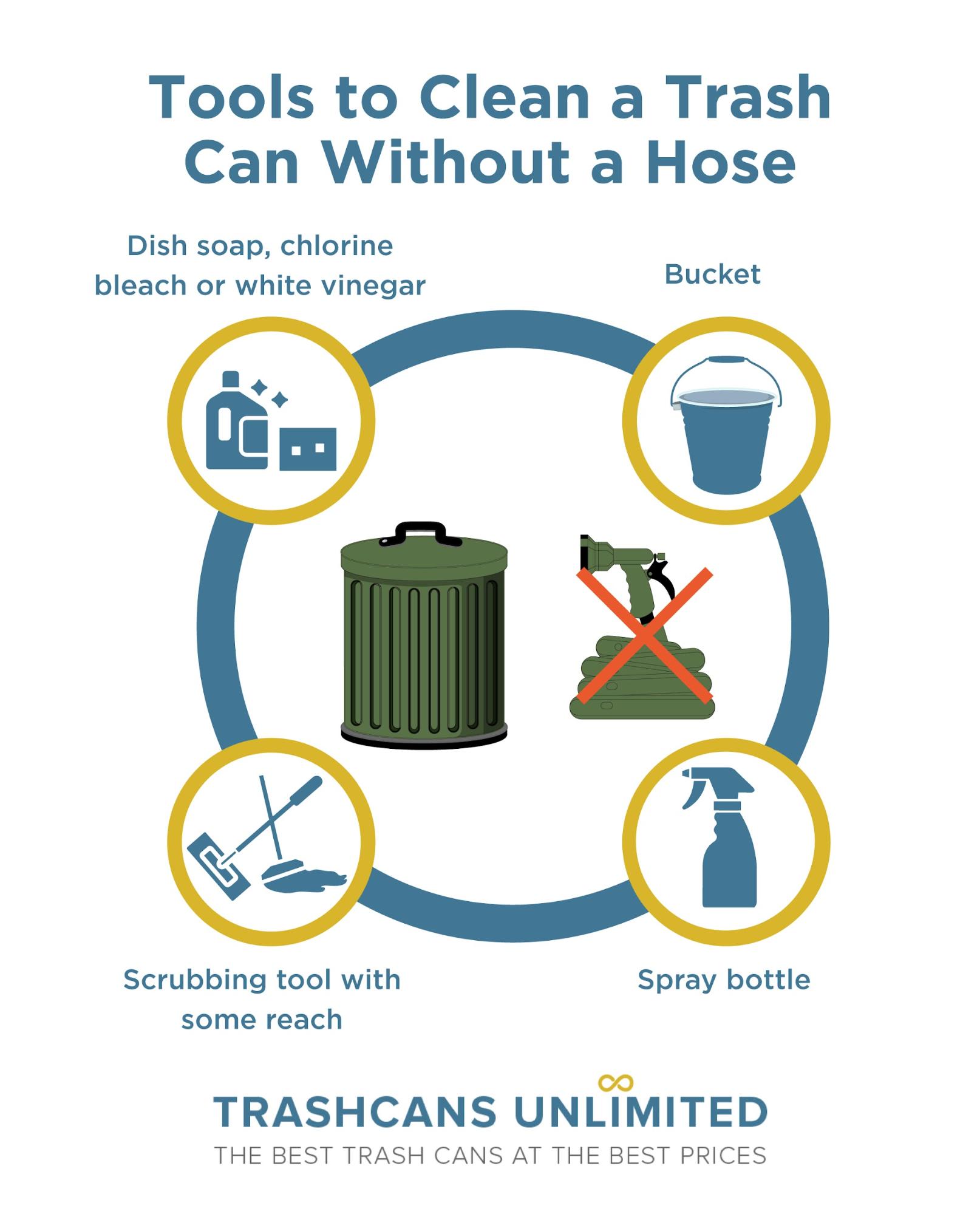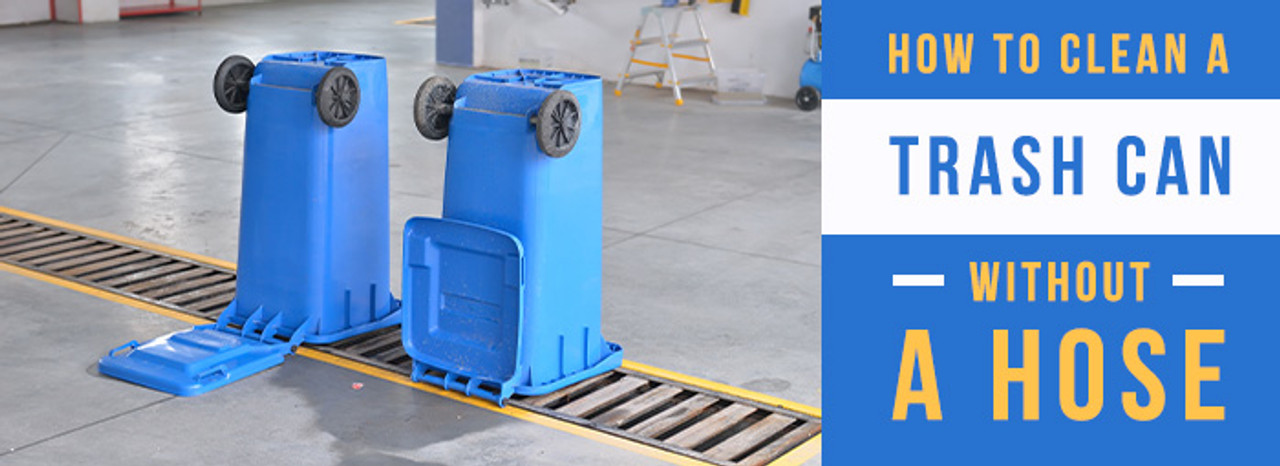If you need to clean a trash can and don’t have a hose handy, this is the article for you. Not having a hose means not having a way to spray down the trash can, and you have a reduced reach in the tight spaces of the can, but it’s not the end of the world. There are three methods to approach trash can cleaning without a hose:
- The bucket method
- The spray bottle method
- The car wash method
Signs It’s Time to Clean the Trash Can
If your can has a bad odor, mold, or fungus growth, or if there are varmints like maggots, rats, or raccoons, it’s time to clean the can.

Tools to Clean a Trash Can Without a Hose
Here are some tools to gather to make the cleaning process easier:
- A large bucket
- Dish soap, bleach, or white vinegar mixed with water, or another cleaning solution
- A spray bottle or a cup or pan of water
- A floor mop or a scrubbing tool with range so you don’t have to climb inside the can
Steps to Clean a Trash Can Without a Hose
Cleaning a plastic or metal outdoor trash can without a hose is not too different from the care and cleaning of stainless steel trash cans.
The Bucket Method
- Fill a bucket with water and soap, or water and another cleanser. You may need to refill the bucket several times depending on the size of the can being cleaned.
- Empty out the trash can, making sure there’s no debris to get in the way.
- Pour your cleaning solution down the sides of the can.
- Lay the trash can on its side, and scrub the sides of the can with cleaning solution or soapy water.
- If you’ve got serious grime problems, using an old mop or scrub brush on a stick to break loose caked-on dirt is a great idea
- Rinse the trash can after it is all cleaned, wipe dry and leave it open to dry.
- You can clean the outside of the can the same way as the inside.
Cleaning a Trash Can without a Bucket: The Spray Bottle Method
No bucket? I bet you do have other liquid containers handy. Depending on how big your trash can is and how dirty it is, you may be able to rinse it with only a spray bottle of a cleaning solution, like soap, vinegar, or bleach mixed with water. However if it’s going to take too long, it might be worth it to find a bucket or get a hose. Buckets are always a good investment.
Go to the Self-Serve Car Wash
The last option is the car wash method. If you don’t want to wash your trash can by hand, or don’t have a good place to wash your trash can, you can take it to a self-serve car wash. These car washing businesses have pressure washers, soap, and other cleaning products so you’ll be able to get things cleaned quickly.
Cleaning vs. Sanitizing vs. Disinfecting
Many people don’t know the difference between cleaning, sanitizing, and disinfecting. Although they usually go hand-in-hand, it’s important to know the difference and when which one is necessary.
- Cleaning is the actual process of removing dirt, germs, viruses, and bacteria. Usually, people clean with soap and water. Cleaning might not remove or kill all of the germs, but it greatly reduces the risk.
- Sanitizing is related to public safety standards, and it refers to removing and lowering the numbers of germs to a safe level.
- Disinfecting is how you use chemicals to annihilate germs. It doesn’t necessarily mean cleaning, per se (usually cleaning must be performed disinfecting), but the goal of disinfection is to lower the risk of infection from all manner of nasty environmental hazards.
How to Keep Trash Cans Clean
Well, you’ve now cleaned your trash can without a hose. But, how do you keep it clean going forward into the future? Here’s some easy tips to keep things working well.
1. Clean Trash Cans Regularly
Regular cleaning helps make cleaning an easier task to tackle going forward. If the can gets schmutz on it, make sure to clean it up then and there, rather than waiting for things to be solved in the future.
2. Get the Right Trash Bags
If you’re not using trash bags already, now’s the time to make the switch. Well-tied garbage bags seal grime and odors inside. You may need to switch to sturdier bags if they leak or smells are escaping. Your bags could be breaking open when tossed in the garbage.
3. Maintain a Good Seal
A well-sealed trash can will help keep invasive pests at bay, whether they be feral cats, rats, or raccoons. If you have problems with pests, consider investing in dog proof trash cans to keep animals from digging in your garbage. Investing in motion-sensor light and/or sound emitters, or taste-deterrents like peppermint oil or cayenne pepper are a great way to keep animals out.
4. Keep it Dry
Bacteria and mold thrive in moist, warm environments. Do your best to keep liquids out of the trash bins, bags, and the can itself. You can also air out the can by leaving the lid open on dry days. Remember to close it back up to prevent more moisture from getting back in, and to keep away scavengers looking for a meal.
5. Get the Right Trash Cans
If you’re regularly disposing of particularly wet, dirty, smelly, greasy, garbage or waste that can damage the trash can, consider getting multiple containers dedicated to disposing of those, or heavy duty trash cans that can handle them.
To help keep your trash can clean, get designated recycling, compost, or trash bins to help separate the garbage that can make your trash can dirty, like food scraps, recyclables, and yard waste. At Trashcans Unlimited, we have everything you need:
- Compost bins
- Recycling bins
- Lawn and garden containers
- Hot coal disposal cans
- Wood trash cans
- Galvanized steel cans
- Restaurant trash cans
- Metal trash cans
- Industrial trash cans
- Commercial grade trash cans
- Concrete trash cans
If your trash can is beyond repair and you need a new one, Trashcans Unlimited is here to help. We’ll make sure that you have the right knowledge and expertise to get any job done, and we’ll sell you the cans at great prices to make sure you have the right equipment. Get in touch with us today, or start browsing our selection.

